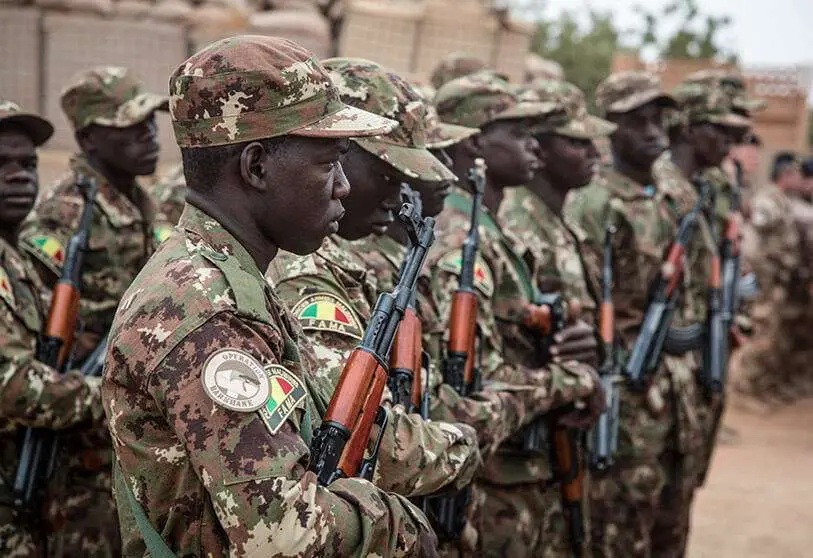Mali opens investigation into army massacre of 300 civilians in the country

The small Malian town of Mora has witnessed a massacre. Human Rights Watch (HRW) confirmed that the local army executed more than 300 civilians there between 27 and 31 March in collaboration with a group of foreign soldiers, later identified as Russian mercenaries, as part of an anti-terrorist operation targeting the central region of the country, which is partly controlled by Islamist militias linked to al-Qaeda in the Islamic Maghreb (AQIM).
The investigation launched by the organisation gathered testimonies from 27 people with knowledge of what happened. They ranged from community leaders to foreign diplomats, as well as witnesses on the ground who witnessed the executions. Hundreds of people gathered in Mora were shot in small groups by the military in what was the largest massacre committed by the army since the beginning of anti-terrorist operations in Mali.
The communiqué issued by the Malian Ministry of Defence days after the massacre stated that the armed forces arrested 51 "terrorists" and pulverised 203 others who were preparing a meeting of the different insurgent battalions, known as 'Katibat'. The army claims that it faced "fierce resistance" in a large-scale operation, and that those "neutralised" were from the ranks of Islamic extremist groups operating in the region. But this version has been denied.

Mora, a town of 10,000 inhabitants in the heart of Mali, has been at the centre of the latest major outbreak of violence in the African country. The last few months, especially since the end of 2021 coinciding with the quasi-complete withdrawal of Operation Barkhane, have been characterised by an upsurge in violence in the form of killings and summary executions of civilians at the hands of Daesh and Al Qaeda-affiliated terrorist groups. But the Malian security forces have also been involved in these actions as a result of the presence of mercenaries from the Wagner Group.
The country has been led since August 2020 by Assimi Goïta, the colonel at the head of the military junta that staged a coup d'état, the fourth since independence in 1960, against then-President Ibrahim Boubacar Keita. So it is the army that is pulling the strings and, with its policy of closing ranks, has flatly rejected the accusations about the massacre in Mora as "unfounded".
"Those who give voice to these unfounded reports have no other objective than to damage the image of the armed forces, which are resolutely dedicated to fighting for freedom, security and the protection of populations," the army said in a statement in response to the investigation by Human Rights Watch, which is studying in parallel another alleged massacre of civilians in March that was allegedly committed by Daesh in the Malian region of Menaka.

In the massacre committed by the Malian forces, hundreds of members of the Fulani community were executed, a Muslim-majority people who have nurtured members of jihadist groups in the region, who in turn have been able to exploit the marginalisation to which they are subjected by the authorities.
The Malian judiciary opened an investigation this week to shed light on the case in the face of accusations from various diplomatic bodies. The European Union's high representative for foreign policy, Josep Borrell, demanded that Bamako grant the United Nations Mission in the country (MINUSMA) access to the place where the executions took place because, although the mission has a base in Mopti, some 50 kilometres from Mora, access is limited.
"The National Gendarmerie opened a case following instructions from the Ministry of Defence and Veterans Affairs to carry out thorough investigations to clarify all these accusations," declared the prosecutor of the military court in Mopti. This opening was echoed by the Chief of Staff, General Omar Diarra, who sent a message of calm to the population and assured that the army would respect, as it has done up to now, compliance with international humanitarian law and human rights".

The presence of the Wagner Group intensified following the Elysée's decision to partially withdraw its troops from the Barkhane operation after nine years of joint anti-terrorist operations in the African country. The Malian military junta demanded a withdrawal in order to put an end to what they denounce as an "occupation". The disagreement between Paris and Bamako has since been exploited by the Russian entity, which operates in the shadows in other countries in the region such as Libya and the Central African Republic.
Its fingerprints are present in other executions of civilians in Mali. Between December 2021 and March 2022, at least 71 people have been killed by the Malian army, according to HRW, in cases where witnesses recognised "white soldiers" speaking an unknown language.








